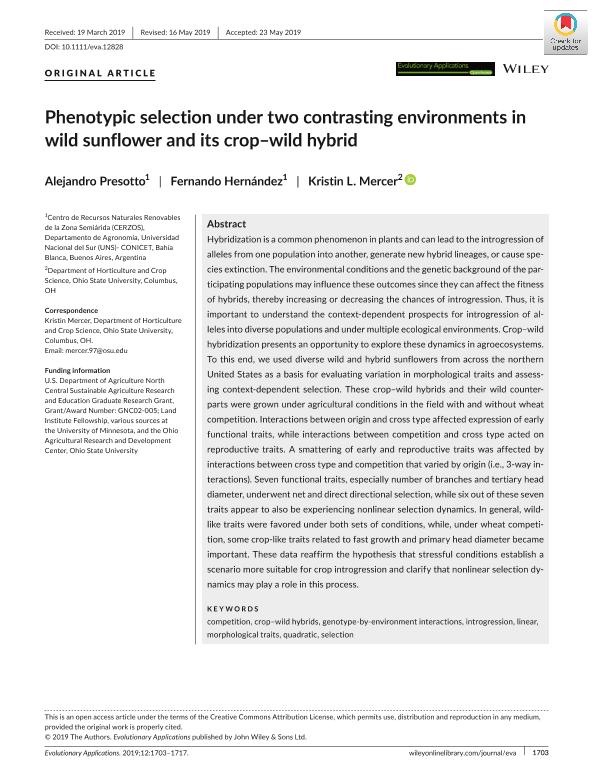Mostrar el registro sencillo del ítem
dc.contributor.author
Presotto, Alejandro Daniel

dc.contributor.author
Hernández, Fernando

dc.contributor.author
Mercer, Kristin L.
dc.date.available
2020-04-13T04:23:32Z
dc.date.issued
2019-06-05
dc.identifier.citation
Presotto, Alejandro Daniel; Hernández, Fernando; Mercer, Kristin L.; Phenotypic selection under two contrasting environments in wild sunflower and its crop‐wild hybrid; Wiley Blackwell Publishing, Inc; Evolutionary Applications; 12; 8; 05-6-2019; 1703-1717
dc.identifier.issn
1752-4571
dc.identifier.uri
http://hdl.handle.net/11336/102350
dc.description.abstract
Hybridization is a common phenomenon in plants and can lead to the introgression of alleles from one population into another, generate new hybrid lineages, or cause species extinction. The environmental conditions and the genetic background of the participating populations may influence these outcomes since they can affect the fitness of hybrids, thereby increasing or decreasing the chances of introgression. Thus, it is important to understand the context‐dependent prospects for introgression of alleles into diverse populations and under multiple ecological environments. Crop‐wild hybridization presents an opportunity to explore these dynamics in agroecosystems. To this end, we used diverse wild and hybrid sunflowers from across the northern United States as a basis for evaluating variation in morphological traits and assessing context‐dependence selection. These crop‐wild hybrids and their wild counterparts were grown under agricultural conditions in the field with and without wheat competition. Interactions between origin and cross type affected expression of early functional traits, while interactions between competition and cross type acted on reproductive traits. A smattering of early and reproductive traits were affected by interactions between cross type and competition that varied by origin (i.e., 3‐way interactions). Seven functional traits, especially number of branches and tertiary head diameter, underwent net and direct directional selection, while six out of these seven traits appear to also be experiencing non‐linear selection dynamics. In general, wild‐like traits were favored under both sets of conditions, while, under wheat competition, some crop‐like traits related to fast growth and primary head diameter became important. These data reaffirm the hypothesis that stressful conditions establish a scenario more suitable for crop introgression and clarify that non‐linear selection dynamics may play a role in this process.
dc.format
application/pdf
dc.language.iso
eng
dc.publisher
Wiley Blackwell Publishing, Inc

dc.rights
info:eu-repo/semantics/openAccess
dc.rights.uri
https://creativecommons.org/licenses/by/2.5/ar/
dc.subject
COMPETITION
dc.subject
MORPHOLOGICAL TRAITS
dc.subject
SELECTION
dc.subject
LINEAR
dc.subject
QUADRATIC
dc.subject
CROP-WILD HYBRIDS
dc.subject
INTROGRESSION
dc.subject
GENOTYPE BY ENVIRONMENT INTERACTION
dc.subject.classification
Agronomía, reproducción y protección de plantas

dc.subject.classification
Agricultura, Silvicultura y Pesca

dc.subject.classification
CIENCIAS AGRÍCOLAS

dc.title
Phenotypic selection under two contrasting environments in wild sunflower and its crop‐wild hybrid
dc.type
info:eu-repo/semantics/article
dc.type
info:ar-repo/semantics/artículo
dc.type
info:eu-repo/semantics/publishedVersion
dc.date.updated
2020-02-26T19:37:29Z
dc.journal.volume
12
dc.journal.number
8
dc.journal.pagination
1703-1717
dc.journal.pais
Reino Unido

dc.journal.ciudad
Londres
dc.description.fil
Fil: Presotto, Alejandro Daniel. Consejo Nacional de Investigaciones Científicas y Técnicas. Centro Científico Tecnológico Conicet - Bahía Blanca. Centro de Recursos Naturales Renovables de la Zona Semiárida. Universidad Nacional del Sur. Centro de Recursos Naturales Renovables de la Zona Semiárida; Argentina. Universidad Nacional del Sur. Departamento de Agronomía; Argentina
dc.description.fil
Fil: Hernández, Fernando. Consejo Nacional de Investigaciones Científicas y Técnicas. Centro Científico Tecnológico Conicet - Bahía Blanca. Centro de Recursos Naturales Renovables de la Zona Semiárida. Universidad Nacional del Sur. Centro de Recursos Naturales Renovables de la Zona Semiárida; Argentina. Universidad Nacional del Sur. Departamento de Agronomía; Argentina
dc.description.fil
Fil: Mercer, Kristin L.. Ohio State University; Estados Unidos
dc.journal.title
Evolutionary Applications

dc.relation.alternativeid
info:eu-repo/semantics/altIdentifier/url/https://onlinelibrary.wiley.com/doi/abs/10.1111/eva.12828
dc.relation.alternativeid
info:eu-repo/semantics/altIdentifier/doi/http://dx.doi.org/10.1111/eva.12828
Archivos asociados
